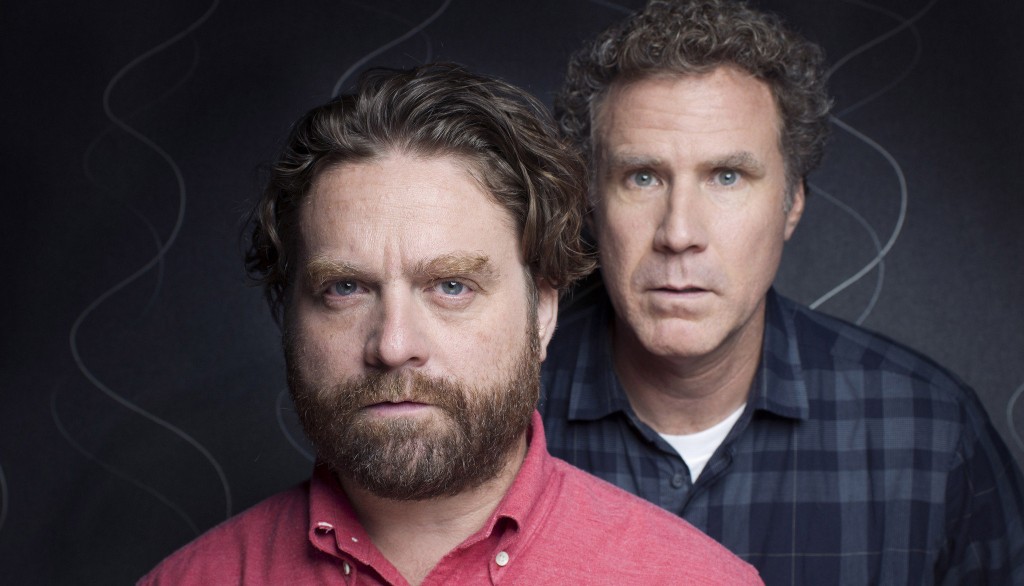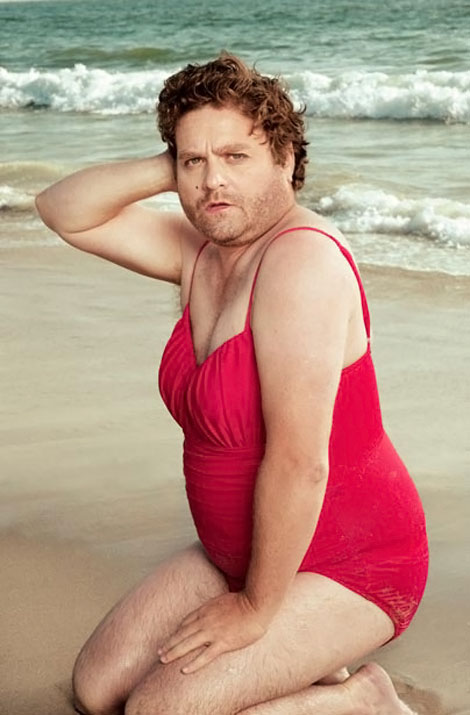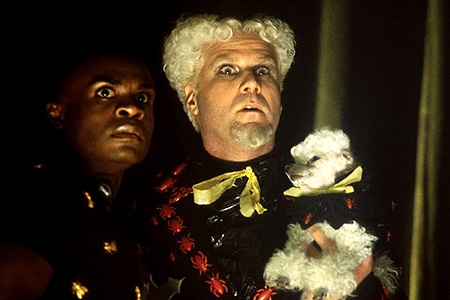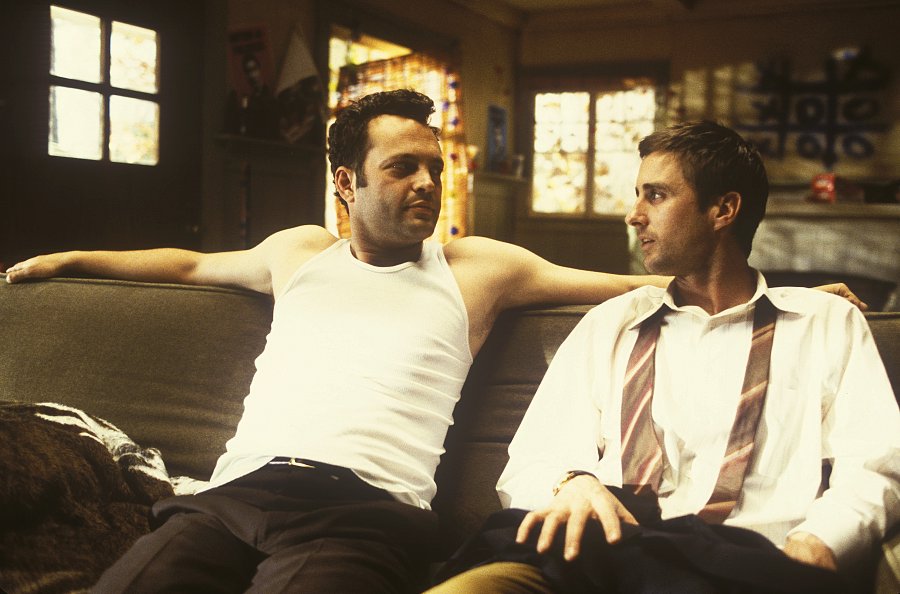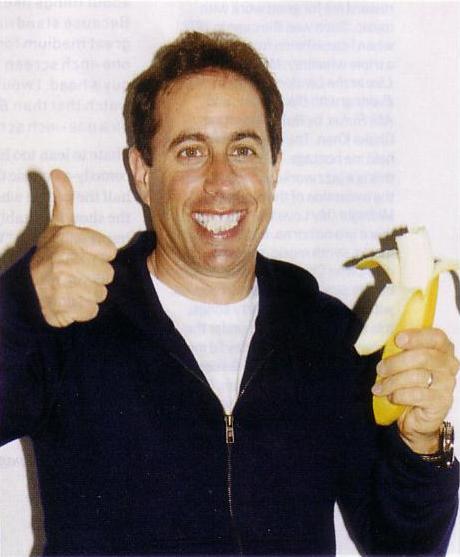James looks at how the careers of Will Ferrell and Zach Galifianakis represent the presidencies of George W. Bush and Barack Obama.
On August 10th, George W. Bush and Barack Obama will face off in an election. Now it may sound like I have the date wrong, and one of the names wrong, but I’m not talking about this year’s presidential election. I’m talking about the movie The Campaign.
Allow me to clarify what I mean a little. When I first saw the trailer for The Campaign I started thinking about the fact that these were two high-profile comedic stars in the same movie. I then started thinking about how the confrontational nature of the film, two men running against each other in an election, will probably lead to many reviewers commenting on which actor was funnier in the film. What struck me as interesting was the way that their battle for a Congressional seat in this movie seemed to line up with their real-life experiences in comedy.
In The Campaign, Will Ferrell plays the incumbent, a man who has held the seat with little competition for five terms, and Galifinakias plays the newcomer attempting to take the position from him. And while it seems as though the two actors get along in real life, this scenario reflects the way that Ferrell has arguably been the dominant actor in comedy for quite a while now. Yet over the past few years Galifinakias has been trying to take that distinction for his own. Comedy is not as inherently competitive as electoral politics, which may only have one winner and one or more losers, but since around the turn of the millennium, Ferrell has been the face of mainstream American comedy. He found a lot of success on television with his well-liked run on Saturday Night Live, being largely responsible for the resurrection of that show from a low point in the mid-1990s, so much so that he now has three ‘Best Of’ episodes, has hosted two season finales since he left, and is seen as one of the stars of the recent SNL era. Even with a few certifiable misses, his movie career from that time span has some memorable successes, from his small parts in Zoolander and Old School to widely-loved vehicles like Anchorman, Talladega Nights, Blades of Glory and Step-Brothers. All these successes helped him become the recipient of the Mark Twain Prize for American Humor, a pretty prestigious award for any comedian. He has certainly found mainstream success, and while most people wouldn’t consider him a has-been, it would seem as though we’ve seen him peak. As Ron Burgundy might say, he’s a pretty big deal, but I think it’s fair to say he’s no longer the ‘It’ guy in comedy. The best candidate for that title would most likely be Zach Galifinakias.
Or at least it seemed that way a few years ago. Since he broke onto scene in a major way in The Hangover, his career has had lots of heat, and he’s enjoying lots of mainstream popularity. And while Ferrell is certainly a more established star, his heat seems to have been dying off in recent years. Maybe it’s too early to call, but Galifinakias seems to be giving Ferrell a run for his money for the crown in the land of American comedy films. If it really is a changing of the guards, we can trace it back to a pretty precise moment. Land of the Lost, still Ferrell’s biggest bust, came out on the exact same day as The Hangover, still Galifinakias’ biggest hit, and the film that catapulted him into mass society’s consciousness overnight. Because of Ferrell’s success and popularity, Land of the Lost was given a massive, bloated budget and failed miserably with critics and the public while The Hangover, with a small budget, a risky R-rating and no true star to carry it, was a giant sleeper success, becoming one of the big hits of 2009. Ferrell’s star is shown as vulnerable, just as Galifinakias was breaking out in the movie everyone was talking about. And this is where The Campaign fits in. We see Will playing defense against Zach’s attempts to replace him. Ferrell’s character, Cam Brady, is used to cruising in for an easy victory and a few more years on top. But Galifinakias’ character, Marty Huggins, is willing to put up a fight to take over his role.
Beyond the order of who is trying to replace who in the film lining up with the comedian’s careers, we also the personalities and campaigning styles matching with our actor’s shticks. Cam Brady seems like the more predictable politician, confident yet well-liked and relatable while Marty Huggins is more of a wild card, awkward and ill-suited for public office. There are definitely shades of the actors’ comic styles in these descriptions. Will Ferrell often plays a common comedic character, the loud, arrogant idiot who we can laugh at when he makes mistakes. Zach Galifinakias is much more often a weirdo who makes us laugh to stop the cringing he evokes in us. While Zach isn’t the first person to draw laughs this way, the socially awkward angle is a style we would see less than Ferrell’s brazen stupidity, particularly in the Ferrell dominated era of late. So while The Campaign will function as a narrative on its own, we can also look at it as Zach and his style attempting to usurp Ferrell and his style from the throne. Since the Land of the Lost/Hangover weekend in June 2009 is a pretty good moment to point to as the end of the Ferrell-era, what will pop culture/comedy nerd history see as the beginning of it? My best guess was that it started around the year 2001, when Ferrell was huge on SNL, and cracked into film success in a meaningful with his role in Zoolander.
This gives us the ballpark period of 2001 to 2009, and as we are talking about Will Ferrell, it’s worth noting those were the exact years of the presidency of George W. Bush, one of the most popular ‘characters’ Ferrell played during that time. And while I am not suggesting that his impersonation is solely responsible for this success, it obviously helped. What seems clear is that Ferrell was not just most successful during Bush’s presidency, but that he is emblematic of the Dubya era, and that the two men’s careers have a lot of fascinating similarities.
Ferrell played Bush on SNL for three years, would reprise the role on MTV award shows and late night programs, and even won a Tony Award for Best Special Theatrical Event for You’re Welcome America: A Final Night with George W. Bush. The two simply have some natural physical similarities and Ferrell has shown he is adept at filling in the rest.
More coincidentally, the timeline of Ferrell’s dominance is oddly close to that of Bush’s presidency. Just look at his profile-raising appearance as Mugatu in Zoolander, his first non-SNL movie role that seemed to actually matter to the plot. The fact that it was Zoolander that elevated his viability as a film actor brings up some eerie connections to Bush.
Zoolander is now seen as a cult movie because of, well, how fucking funny it is, but it didn’t make a lot of money in its theatrical release. However, many people forget that it didn’t fail commercially just because of the content of the movie, but also the context of the world it was released into. Zoolander came out just two weeks after the terrorist attacks of 9/11, and was one of the first comedies to hit theatres after the biggest American tragedy of our generation. The attacks and the movie have a few unsettling links between them. You can see a billboard for Zoolander in Oliver Stone’s World Trade Centre, but it gets much weirder than that. Perhaps the creepiest connection is that the first television footage of the attacks, shown on Fox affiliate WNYW, actually interrupted a commercial for Zoolander. The first movie that gave Ferrell a chance at a significant role in a non-SNL film is weirdly tied up with the event that defined Bush’s presidency.
Probably the most notable aspect of Bush’s presidency after 9/11 was his response to it, specifically the subsequent War on Terror and particularly the invasion of Iraq. Oddly enough, Ferrell’s next notable roles come right around the time of that military action. Sure, he played the forgettable Federal Wildlife Marshal Willenholly in the I-wish-I-could-forget Jay and Silent Bob Strike Back right before 9/11, and the important sounding role of ‘Brian’s boyfriend’ in 2002’s I-bet-he-wishes-he-could-forget romcom Boat Trip, but after that, his next film credit is as Frank ‘the Tank’ Ricard in the much-loved Old School, just two and a half months before the invasion of Iraq began. His next role after the invasion was as Rob Burgundy in what will likely be viewed as his magnum opus, Anchorman.
Mugatu was probably the role that gave filmmakers confidence in Ferrell, but it was Old School that contained his breakout role that made the public take notice. Once again, it’s not just that only a few months separate the film from its presidential counterpart. Frank the Tank is memorable in this movie, but he doesn’t really control the action. His life suffers significant change as a result of his friend Mitch (Luke Wilson) getting a house near a college, and Bernard (Vince Vaughn) wants to make the most of this new experience for Mitch, by throwing parties and pressuring everyone around him to act like college kids again. Frank’s life is greatly affected by changes in Mitch’s life, as well as the decisions of Bernard. If Old School is Ferrell’s War on Terror, Mitch and Bernard are his Rumsfeld and Cheney, making up his mind for him and leaving him to deal with the consequences.
It’s not just the timing and nature of their notable career points that align Bush and Ferrell but their personalities, or at least the personality that Ferrell tends to have on film. He has played Bush on stage and screen, looks to be playing a thinly-veiled Bush in The Campaign, and has played variations of the Bush archetype in many films. While the former president had his more radical critics calling him a war criminal and an evil mastermind, the common perception of him now is that of a simple yet confident guy who got in way over his head. Pop culture history, and probably history proper as well, will remember him as a manchild, confident but not that bright, out of his element yet unaware, and this is the type of character we so often Ferrell play.
Bits of W’s life experience can be plucked from Ferrell’s own filmography. Just as Bush was the owner of the Texas Rangers with little experience, Ferrell coaches out of his element in Kicking and Screaming. We see him struggle with grown up life and responsibilities, causing him to relapse into alcoholism in Old School. In Step Brothers we see a father who has made life easy for his son, and then expects him to go into the world and get a real job in middle age, similar to the way Bush was pretty much given companies to run for decades, a way out of the Vietnam war, only to end up halfway through his life and seemingly clueless about the next half. Anchorman sees a fun-loving imbecile make it to the top of his field with the help of those around him coddling and protecting him. In Talladega Nights we see him at his most Bush-like, complete with an accent and demeanour often employed in his Bush impersonation, a southern idiot who lucked into the spotlight*. Even though Ferrell’s characters aren’t likeable, they usually aren’t hateable either. It’s similar to Bush; his laugh is a goofy staccato exhalation, not an evil cackle. His smile is a silly look of clueless but genuine happiness, not a sneer out of the side of Cheney’s mouth. Bush and the amalgamation of Ferrell’s characters may not be great people, but they aren’t evil…and they both seem like decent drinking buddies. Ferrell’s comedy is easy, accessible, asking to be liked, just like Bush doesn’t say things that make you feel dumb, and gives you a nickname so you might hang out for one more beer.
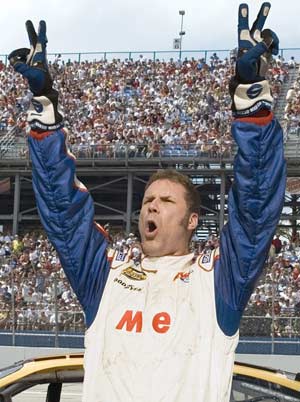 *The whole plot of Talladega Nights even functions oddly well as a metaphor for Bush’s life and then specifically his War on Terror. Ricky Bobby follows his father in his footsteps and takes over his job, as Bush did from his formerly presidential father. Then we get to the struggles of Bush’s convincing the world of his War on Terror. The antagonist, Jean Girard, is from France, the most vocal critic of the invasion of Iraq, and is cultured, intelligent and homosexual, three characteristics thought of as the antithesis of Bush’s Texan cowboy personality. Bobby eventually partakes in the final race after his wife, friend and sponsor have abandoned him, as part of the coalition of the unwilling, and he wins the race unilaterally, with a car that says ME on it instead of the normal Nascar style of logo bombardment, just as Bush ignored international consensus and the U.N. and invaded Iraq largely on his own. I am aware this is a bit of a stretch, and director Adam McKay is pretty vocally against Bush’s actions, but the comparison fits oddly well.
*The whole plot of Talladega Nights even functions oddly well as a metaphor for Bush’s life and then specifically his War on Terror. Ricky Bobby follows his father in his footsteps and takes over his job, as Bush did from his formerly presidential father. Then we get to the struggles of Bush’s convincing the world of his War on Terror. The antagonist, Jean Girard, is from France, the most vocal critic of the invasion of Iraq, and is cultured, intelligent and homosexual, three characteristics thought of as the antithesis of Bush’s Texan cowboy personality. Bobby eventually partakes in the final race after his wife, friend and sponsor have abandoned him, as part of the coalition of the unwilling, and he wins the race unilaterally, with a car that says ME on it instead of the normal Nascar style of logo bombardment, just as Bush ignored international consensus and the U.N. and invaded Iraq largely on his own. I am aware this is a bit of a stretch, and director Adam McKay is pretty vocally against Bush’s actions, but the comparison fits oddly well.
Bush isn’t the only president we can match up with a dominant voice in comedy during his administration. To look back to the president before, we have Bill Clinton, who is easily aligned with Jerry Seinfeld. They both dominated the 1990s, and were at the top of their respective field for so much of the decade, with Clinton holding the highest office in the land for eight years and Seinfeld having a wildly successful show for nine, while remaining one of the biggest names in stand-up comedy. Once again, the timing lines up well (Seinfeld ran from July 1989 to May 1998, while Clinton’s term ran from January 1993 to January 2001), but there’s much more than that.
Perhaps it’s unfair to his presidency, but the defining moment of Clinton’s presidency was the Monica Lewinsky scandal. He doesn’t have a 9/11, or an invasion of Iraq, or a Hurricane Katrina… he has a blowjob. This isn’t to say that he is just a better president than Bush with fewer mistakes, but that Clinton didn’t have the same big moments, big issues, big political topics to remember him for, good or bad. He won’t be remembered for a war, or signing a piece of important legislature, but for putting his dick in someone’s mouth which, when you consider all the things a president does, was not a particularly big deal. Clinton had a presidency about nothing; Seinfeld had a show about nothing. The Clinton era had economic expansion and relative peace, but no great patriotism resulted, and there was no nationally unifying event. There was pretty much everything you could have asked for except any real appreciation. There was wealth and comfort, but no passion. And because of how everything ended, with a mistake and an apology, the administration was a success, and there was no real way to enjoy it. In his show, Jerry Seinfeld was a successful comedian, eventually with his own fictional television show inside the real show, who seemed to have a deep roster of good looking women to sleep with, but he could never enjoy himself because the buttons on his shirt were at the wrong intervals. As my brother Colin said on the subject:
Seinfeld was the show about nothing in an era that now, looks like nothing. Surely at the time, it all looked like a big deal, but I assure you, it wasn’t. Yes there was terrorism, and the first World Trade Centre bombing, but it took a Global War on terrorism and its gross multinational body count to give the 1990s version some new scale. Bill Clinton’s scandal was blowjobs; Bush’s was specious war, torture and an American city underwater. Seinfeld too was a big deal, but it wasn’t quite as fresh and cutting edge as we gave credit for. Watch one now and cringe at the laugh track. Watch two and see the conventions of dating and workplace HR problems come up over and over. Bill Clinton and Jerry Seinfeld have small, manageable problems that only seem like problems to them. Clinton had the ‘problem’ of gays in the military, which lead him to deliberate, spend political capital before splitting the baby in two, approving Don’t Ask, Don’t Tell.
Not that there’s anything wrong with that. It was a time when things weren’t so divisive and weren’t so serious. What Clinton did with Monica Lewinsky seemed important then but not as much anymore and it is the ending of Clinton’s term that is perhaps its most Seinfeldian aspect. Seinfeld is often referred to as existentialist in the way that it pragmatically questions which rules society has created are really important, and to what degree must we follow them at the expense of something else. The show constantly examined etiquette, unwritten rules and the minute details of the social contract modern city dwellers are part of. This idea was extrapolated to the fullest with Lewinskygate. Should some oral sex really end a generally successful presidency? Should feelings get in the way of how a global superpower functions? Sure, marriages come with their rules but is it good for all of us for the job of the most powerful man in the world (who had the highest outgoing approval rating of any president since the end of World War II, just as Seinfeld had the highest outgoing ratings on TV in his final season) to be compromised by some gummers? Even right down to the transcripts of the Congressional hearings about the scandal, we see Seinfeldian dialogue. Clinton actually stated that his answer to a question depends on what the asker’s definition of ‘is’ is. This sounds a lot more like Jerry trying to lie to his girlfriend, or George trying to weasel out of something at work, than the death throes of the Commander in Chief.
So if Jerry Seinfeld is Bill Clinton and Will Ferrell is George W. Bush, then next in line must be Zach Galifinakias as Barack Obama. It admittedly looks easier to draw the line between Ferrell and Bush than between Galifinakias and Obama, but the connections are certainly there. Will looked enough like George to play him in on SNL, likely the most relevant stage for presidential impersonation, whereas the difference between the other two is one of height, body type, demeanour and race. But while tall vs. short, thin vs. plump, bearded vs. clean-shaven, black vs. white, awkward and abrasive vs. confident and smooth does reveal them as different in many ways, they have a lot in common in some very important ways. It’s hard to say now how we will look back on the Obama presidency and Galifinakias’ rise in popularity because we’re still involved in them, but some similarities are clear now. Bush, the son of a president, and Ferrell, talented at playing a goof with a short temper, seem like obvious choices for their professions, whereas Obama and Galfinakias don’t look like shoo-ins. At the risk of sounding too douchey, I used to watch Zach’s stand-up before he was popular, and I liked it a lot, but didn’t think he’d ever get such mainstream success. He was too weird and unsettling. He seemed more concerned at making the best jokes than getting the most laughs, which explains how he had the reputation of being a comedian’s comedian for years. He was doing something for the real fans, the die-hards, the comics who wish they could be so self-indulgent and weird. But it worked. Somehow the comedy that seemed decidedly alt, underground, indie and self-serving became cool, popular and trendy. Before The Hangover, Zach was good, too good for the masses, but he managed to pull it off. It’s not too much of a stretch to see a similarity to Obama. Even if you knew about him before he ran for president, it would have been hard to believe he would win for the obvious reason of his race. He had the education, the charisma and the intelligence but just had something that seemed too major for the majority of people to get over…but they did. Becoming the first black president is more impressive than having a beard and telling weird jokes, but the two things do share common ground.
Barack Obama is certainly president, and Zach Galifinakias is certainly a movie star, but one more thing that connects them is the sense of disappointment in what they’ve done since attaining those roles, at least so far. Obama was a cultural sensation as he campaigned, in America and around the world. He ran on a platform of change but it wasn’t just about the change the people hoped he would create, but a level of change that must have taken place in America if he could get elected. If the nation that was home to the KKK, the Rodney King beatings and so many hate crimes, fairly recent segregation, slavery and the stereotype of the entire American south, could elect a black president, maybe there already has been change, maybe that country is already much better than we thought. And if the country is that much different than it used to be socially, it seemed like Obama was the man to turn this country into all of the other things it could or should be, racially and otherwise. There were promises about Guantanamo Bay, gay marriage, gays in the military, torture, the Iraq war, the wealth gap, etc. that haven’t been met. For a while there was a knee-jerk reaction that saying anything negative about Obama made you a racist or a right wing ideologue or both, but now many people agree that his administration has been underwhelming.
And of course Obama’s career is much more important than Galifinakias’, and hopes were always higher for Chocolate Jesus than Greek Santa, but the same sense of disappointment is creeping in. The Hangover become the highest-grossing R-rated comedy of all time and Zach had a large part in that. We’ve had heavy comedians before but there was something about his unsettling, cringe-inducing, quasi-psychosis that wasn’t too visible in mainstream comedy otherwise. He arrived on the scene quickly, cracked everyone up and a lot was expected of him…but there simply isn’t much after that. Dinner for Schmucks? It’s Kind of a Funny Story? Due Date? These all failed financially and the public perception wasn’t much kinder. Even The Hangover Part II, a sequel to the film that made him, was stale and was met with a resounding ‘meh’. Galifinakias has been coming up short in the same way Obama has. We may have to wait until November to see if Obama wins the presidential election and is allowed a second term, but we only have to wait until The Campaign’s release to see if his comic representative can outdo his predecessor. Hopefully The Campaign and Obama’s campaign are great, because even the comic version of Mitt Romney can’t be funny.

